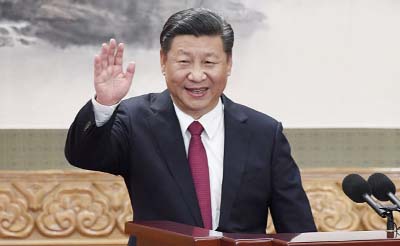
AFP, Beijing :
When President Xi Jinping attends the National People’s Congress, he will swear an oath to uphold China’s constitution. But first, he will remake it in his own image, legally formalising his almost limitless mandate to bend the nation to his will.
On Monday, nearly 3,000 delegates from around the country will gather in Beijing for what could become the nation’s most consequential annual legislative session in decades.
They are expected to rubber stamp major constitutional amendments providing the legal framework for elevating the authority of the Communist Party and its most powerful leader since Mao Zedong.
The two-week session will hand Xi a second five-year stint as president, but it will also likely scrap the constitution’s limits on holding the office, clearing the way for him to rule for life.
The meeting is “very important”, Beijing-based political scholar Hu Xingdou told AFP.
“It’s opening at the most critical period for reforming the party and national system,” he said.
The constitutional amendments, he added, will help Xi usher in his “new era”, where a resurgent China, under the guidance of the Communist Party, will regain what many see as its rightful place at the centre of world affairs.
Achieving that goal-which will be written, along with Xi’s name, into the constitution-requires a strong leader and a strong party, Chinese state media has argued.
But the possibility that Xi could rule for life, like Mao before him, has sparked a public outcry, prompting party censors to furiously stamp out dissenting voices on social media.
The anxiety is understandable, according to Trey McArver, founder of Beijing-based research firm Trivium China.
“This seems like a pretty clear dismantling of some of the important institutions put into place to make a more robust administration.”
The current constitution has been altered four times since its adoption in 1982, when it replaced a previous version written in 1978 in the lead up to the start of the country’s reform period.
In the 1980s, China’s paramount leader Deng Xiaoping sought to move the system away from the one-man rule of the Mao era and separate the functions of the state from those of the party.
“Over-concentration of power is liable to give rise to arbitrary rule by individuals at the expense of collective leadership,” he counselled in 1980, although he never took the advice himself.
When President Xi Jinping attends the National People’s Congress, he will swear an oath to uphold China’s constitution. But first, he will remake it in his own image, legally formalising his almost limitless mandate to bend the nation to his will.
On Monday, nearly 3,000 delegates from around the country will gather in Beijing for what could become the nation’s most consequential annual legislative session in decades.
They are expected to rubber stamp major constitutional amendments providing the legal framework for elevating the authority of the Communist Party and its most powerful leader since Mao Zedong.
The two-week session will hand Xi a second five-year stint as president, but it will also likely scrap the constitution’s limits on holding the office, clearing the way for him to rule for life.
The meeting is “very important”, Beijing-based political scholar Hu Xingdou told AFP.
“It’s opening at the most critical period for reforming the party and national system,” he said.
The constitutional amendments, he added, will help Xi usher in his “new era”, where a resurgent China, under the guidance of the Communist Party, will regain what many see as its rightful place at the centre of world affairs.
Achieving that goal-which will be written, along with Xi’s name, into the constitution-requires a strong leader and a strong party, Chinese state media has argued.
But the possibility that Xi could rule for life, like Mao before him, has sparked a public outcry, prompting party censors to furiously stamp out dissenting voices on social media.
The anxiety is understandable, according to Trey McArver, founder of Beijing-based research firm Trivium China.
“This seems like a pretty clear dismantling of some of the important institutions put into place to make a more robust administration.”
The current constitution has been altered four times since its adoption in 1982, when it replaced a previous version written in 1978 in the lead up to the start of the country’s reform period.
In the 1980s, China’s paramount leader Deng Xiaoping sought to move the system away from the one-man rule of the Mao era and separate the functions of the state from those of the party.
“Over-concentration of power is liable to give rise to arbitrary rule by individuals at the expense of collective leadership,” he counselled in 1980, although he never took the advice himself.

